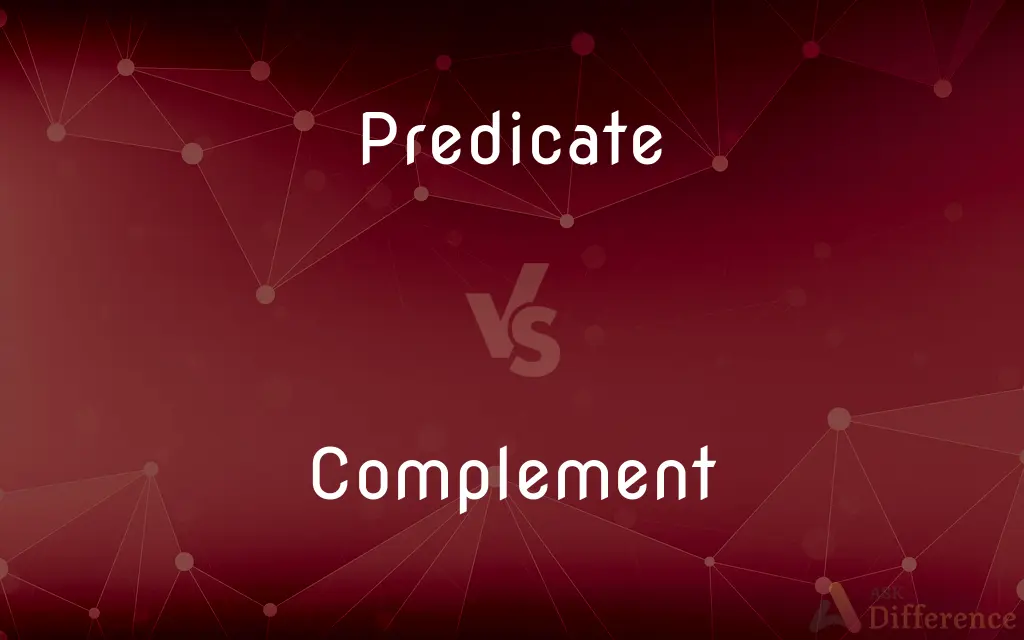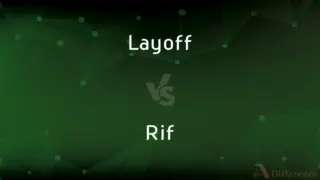Predicate vs. Complement — What's the Difference?

Difference Between Predicate and Complement
ADVERTISEMENT
Compare with Definitions
Predicate
To base or establish (a statement or action, for example)
I predicated my argument on the facts.
Complement
Something that completes, makes up a whole, or brings to perfection
A sauce that is a fine complement to fish.
Predicate
To state or affirm as an attribute or quality of something
The sermon predicated the perfectibility of humankind.
Complement
The quantity or number needed to make up a whole
Shelves with a full complement of books.
Predicate
To carry the connotation of; imply.
ADVERTISEMENT
Complement
The full crew of personnel required to run a ship.
Predicate
(Logic) To make (a term or expression) the predicate of a proposition.
Complement
Either of two parts that complete the whole or mutually complete each other.
Predicate
To proclaim or assert; declare.
Complement
An angle related to another so that the sum of their measures is 90°.
Predicate
To make a statement or assertion.
Complement
(Grammar) A word or words used to complete a predicate construction, especially the object or indirect object of a verb, for example, the phrase to eat ice cream in We like to eat ice cream.
Predicate
(Grammar) One of the two main constituents of a sentence or clause, modifying the subject and including the verb, objects, or phrases governed by the verb, as opened the door in Jane opened the door or is very sleepy in The child is very sleepy.
Complement
(Music) An interval that completes an octave when added to a given interval.
Predicate
(Logic) That part of a proposition that is affirmed or denied about the subject. For example, in the proposition We are mortal, mortal is the predicate.
Complement
(Immunology) A complex system of proteins found in blood plasma that are sequentially activated and play various roles in the immune response, including lysing bacterial cell membranes, making pathogens more susceptible to phagocytes, and recruiting inflammatory cells to sites of infection or injury. Also called alexin.
Predicate
(Grammar) Of or belonging to the predicate of a sentence or clause.
Complement
Mathematics & Logic For a universal set, the set of all elements in the set that are not in a specified subset.
Predicate
Stated or asserted; predicated.
Complement
A complementary color.
Predicate
(grammar) The part of the sentence (or clause) which states a property that a subject has or is characterized by.
Complement
To serve as a complement to
Roses in a silver bowl complement the handsome cherry table.
Predicate
(logic) A term of a statement, where the statement may be true or false depending on whether the thing referred to by the values of the statement's variables has the property signified by that (predicative) term.
A propositional variable may be treated as a nullary predicate.
A predicate is either valid, satisfiable, or unsatisfiable.
Complement
Something (or someone) that completes; the consummation.
Predicate
(computing) An operator or function that returns either true or false.
Complement
(obsolete) The act of completing something, or the fact of being complete; completion, completeness, fulfilment.
Predicate
(grammar) Of or related to the predicate of a sentence or clause.
Complement
The totality, the full amount or number which completes something.
Predicate
Predicated, stated.
Complement
(obsolete) Something which completes one's equipment, dress etc.; an accessory.
Predicate
(law) Relating to or being any of a series of criminal acts upon which prosecution for racketeering may be predicated.
Complement
(nautical) The whole working force of a vessel.
Predicate
(transitive) To announce, assert, or proclaim publicly.
Complement
(heraldry) Fullness (of the moon).
Predicate
(transitive) To assume or suppose; to infer.
Complement
An angle which, together with a given angle, makes a right angle.
Predicate
To base (on); to assert on the grounds of.
Complement
Something which completes, something which combines with something else to make up a complete whole; loosely, something perceived to be a harmonious or desirable partner or addition.
Predicate
To make a term (or expression) the predicate of a statement.
Complement
A word or group of words that completes a grammatical construction in the predicate and that describes or is identified with the subject or object.
Predicate
To assert or state as an attribute or quality of something.
Complement
(music) An interval which, together with the given interval, makes an octave.
Predicate
To assert to belong to something; to affirm (one thing of another); as, to predicate whiteness of snow.
Complement
(optics) The color which, when mixed with the given color, gives black (for mixing pigments) or white (for mixing light).
The complement of blue is orange.
Predicate
To found; to base.
Complement
(set theory) Given two sets, the set containing one set's elements that are not members of the other set (whether a relative complement or an absolute complement).
The complement of the odd numbers is the even numbers, relative to the natural numbers.
Predicate
To affirm something of another thing; to make an affirmation.
Complement
(immunology) One of several blood proteins that work with antibodies during an immune response.
Predicate
That which is affirmed or denied of the subject. In these propositions, "Paper is white," "Ink is not white," whiteness is the predicate affirmed of paper and denied of ink.
Complement
(logic) An expression related to some other expression such that it is true under the same conditions that make other false, and vice versa.
Predicate
The word or words in a proposition which express what is affirmed of the subject.
Complement
(electronics) A voltage level with the opposite logical sense to the given one.
Predicate
Predicated.
Complement
(computing) A bit with the opposite value to the given one; the logical complement of a number.
Predicate
(logic) what is predicated of the subject of a proposition; the second term in a proposition is predicated of the first term by means of the copula;
`Socrates is a man' predicates manhood of Socrates
Complement
The diminished radix complement of a number; the nines' complement of a decimal number; the ones' complement of a binary number.
The complement of is .
Predicate
One of the two main constituents of a sentence; the predicate contains the verb and its complements
Complement
The radix complement of a number; the two's complement of a binary number.
The complement of is .
Predicate
Make the (grammatical) predicate in a proposition;
The predicate `dog' is predicated of the subject `Fido' in the sentence `Fido is a dog'
Complement
The numeric complement of a number.
The complement of −123 is 123.
Predicate
Affirm or declare as an attribute or quality of;
The speech predicated the fitness of the candidate to be President
Complement
(genetics) A nucleotide sequence in which each base is replaced by the complementary base of the given sequence: adenine (A) by thymine (T) or uracil (U), cytosine (C) by guanine (G), and vice versa.
A DNA molecule is formed from two strands, each of which is the complement of the other.
Predicate
Involve as a necessary condition of consequence; as in logic;
Solving the problem is predicated on understanding it well
Complement
Obsolete spelling or misspelling of compliment. should this be at a different ety?
Complement
(biochemistry) alexin
Complement
(economics) complementary good
Complement
To complete, to bring to perfection, to make whole.
We believe your addition will complement the team.
Complement
To provide what the partner lacks and lack what the partner provides, thus forming part of a whole.
The flavors of the pepper and garlic complement each other, giving a very rich taste in combination.
I believe our talents really complement each other.
Complement
To change a voltage, number, color, etc. to its complement.
Complement
(obsolete) Old form of compliment
Complement
That which fills up or completes; the quantity or number required to fill a thing or make it complete.
Complement
That which is required to supply a deficiency, or to complete a symmetrical whole.
History is the complement of poetry.
Complement
Full quantity, number, or amount; a complete set; completeness.
To exceed his complement and number appointed him which was one hundred and twenty persons.
Complement
A second quantity added to a given quantity to make it equal to a third given quantity.
Complement
Something added for ornamentation; an accessory.
Without vain art or curious complements.
Complement
The whole working force of a vessel.
Complement
The interval wanting to complete the octave; - the fourth is the complement of the fifth, the sixth of the third.
Complement
A compliment.
Complement
To supply a lack; to supplement.
Complement
To compliment.
Complement
A word or phrase used to complete a grammatical construction
Complement
A complete number or quantity;
A full complement
Complement
Number needed to make up whole force;
A full complement of workers
Complement
Something added to complete or make perfect;
A fine wine is a perfect complement to the dinner
Complement
One of a series of enzymes in the blood serum that are part of the immune response
Complement
Either of two parts that mutually complete each other
Complement
Make complete or perfect; supply what is wanting or form the complement to;
I need some pepper to complement the sweet touch in the soup
Share Your Discovery

Previous Comparison
Ant vs. Butterfly
Next Comparison
Layoff vs. RIF













































